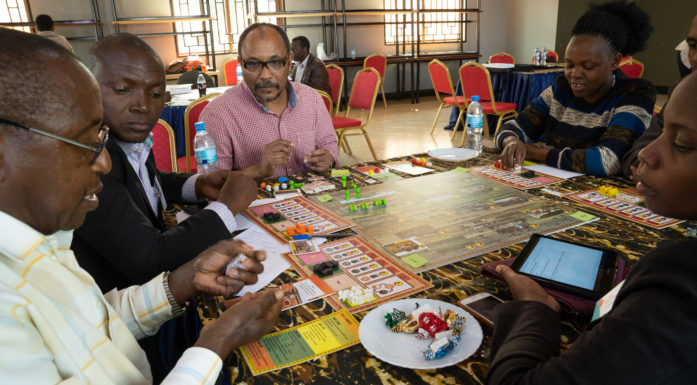Simple steps improve digital learning
Digital teaching and meeting places can work. But some approaches make students feel more connected and improve results.
“One thing that can get lost in digital teaching is the process of building social relationships. This network building normally takes place during coffee breaks, shared lunch and in the queue at the toilet or coffee machine,” says Gunhild Marie Roald, an associate professor in NTNU’s Department of Education and Lifelong Learning.
The relationships between people, how we learn and the way we build networks all change in part when we can no longer meet face to face and look each other directly in the eye.
Roald and her colleagues have looked at what they call “relation building in digital classrooms,” where students and lecturers use digital platforms in teaching.
Camilla Hellesøy Krogstie, a career supervisor at the University of Oslo’s Career Services, and associate professor Patric Wallin and senior lecturer Kristin Landrø fromthe Department of Education and Lifelong Learning at NTNU were also involved in the research.

Relationships between people change in part when we can no longer shake hands. Illustration photo: Shutterstock, NTB
1. Newer platforms can provide more community
The researchers’ data material consists of student logs and focus group interviews from a digital continuing education course.
Perhaps the sense of community and belonging is changing with the introduction of new digital platforms.
The participants didn’t feel as if they were part of a learning community to any great degree. But Roald thinks this could be due to the instructional medium used.
“For this course we used the Blackboard Collaborate Ultra platform, which only allows you to see four faces on the screen at a time,” she says. Roald wonders if maybe the sense of community and belonging is changing as new platforms have come into use during the course of the pandemic.
Even digital mingling is possible now, such as through the Kumospace platform. There, people can meet in a digital corner and talk together in pairs, and then move on to the next person.
2. More community in small groups
The researchers were surprised to find that relationship building can also work well digitally as long as the participants meet in small groups.
“Our teaching is linked to career guidance. It’s largely based on the students practising specific advising skills on each other in groups of three that met in digital group rooms,” says Landrø.
The conditions were suited for relationship building in the small groups.
“We were very excited to see how this would work. It takes a high degree of trust to give of oneself. This applies both when you’re in the supervisor role, as an advisee and as the observer who gives feedback to the supervisor afterwards. All this happens with people you’ve never met before,” Landrø says.
The results show that working in small groups was suited for relationship building. Several students said that they quickly developed trust and security, so they had the courage to try out guidance techniques and share personal issues and feedback with each other.
3. Most people like breaks

Breaks are more popular among individuals who use them for private pursuits, such as taking a walk. Photo: Shutterstock, NTB
The teachers were extra careful to add breaks between the teaching sessions, which most participants appreciated.
“The lunch break was used for all kinds of activities,” Landrø says. The participants’ activities including starting bread dough, going for a walk, eating lunch outdoors, taking down their laundry and doing work-related tasks.
But participants who chose to keep working during the break didn’t appreciate the breaks as much as those who used the breaks for personal pursuits. Those who worked sat in the same place and could become impatient for class to start again.
But for some, taking a break from the classroom helped them process the day’s course material and deepened their learning experience.
“This shows that activities that are linked to our private lives can contribute positively to the learning process. Alternating between our work lives and our personal creates a livelier dynamic. The two can have a positive influence on each other,” says Roald.
4. Combination may be best
Digital platforms also make us more accessible than before, for better or worse. It can be tempting to sacrifice free time for just one more little meeting or email. But this doesn’t just apply in the digital world.
It’s important to remember that humans depend on social contact and on our social relationships.
Veslemøy Berg recently took her master’s degree at NTNU with a thesis on what happens to the social interaction between students when university teaching is digital. Associate Professor Patric Wallin was her supervisor and project partner.
“In our increasingly digitalized everyday life, it’s important to remember that humans depend on social contact and on our social relationships. This is something that can’t be replaced by digital learning platforms,” says Berg.
Her study shows that students prefer physical learning environments. But they are also open to combining physical and digital meeting places in their studies.
Berg believes a combined solution can fill students’ social needs and at the same time allow for a more practical and innovative teaching programme.
- You might also like: Working from home does not make us less productive
5. Knowledge is not the only important thing
Berg points out that designing a teaching plan for higher education requires more than just the technical understanding of the field being studied.
“We also have to take into account the moral dimension of education. Study time and higher education is not only a time to acquire knowledge, but also a time to develop as a person in interaction with others,” says Berg.
So far, the research results have been published in the form of a chapter in an international book on digital learning called Designing Courses with Digital Technologies. The research group has also published an article in the mid-Norway regional newspaper Adresseavisen.
Reference: Landrø, K., Krogstie, C. H., Roald, G. M. & Wallin, P. (2021). Relation building in breakout groups. Designing Courses with Digital Technologies: Insights and Examples from Higher Education. New York: Routledge. DOI:10.4324/9781003144175






